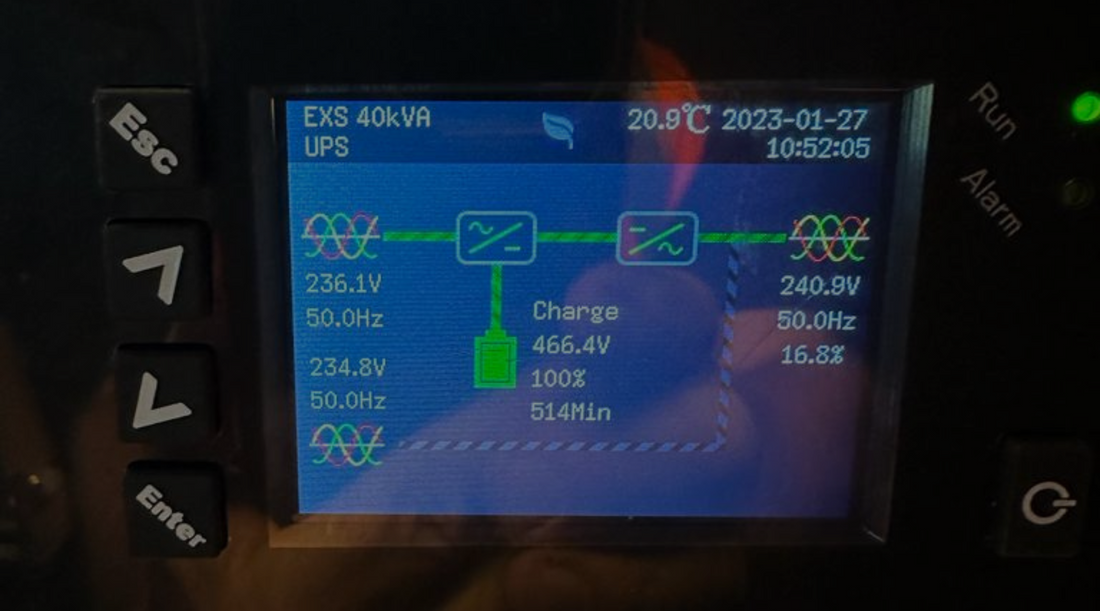An uninterrupted power supply provides emergency power to equipment when the input power source or the main power fails. But, how long do they actually last? In this article, we’re going to look at the average lifespan of a UPS unit and its batteries, what factors can impact the lifespan, tell-tale signs that a UPS is on its way out, and more. Read on and we’ll tell you everything you need to know.
What factors impact the life of a UPS?
What factors negatively impact the life of a UPS? For example, is it OK to keep your UPS plugged in at all times?
The lifespan of your UPS is largely affected by its in-use environment. Things like the quality of your power input, the temperature of the battery, and the frequency of your UPS’s discharge cycles.
As such, if you want to get the most out of your UPS, invest in a higher quality input power (the cleaner the better), keep it in the right environment, and strive to not let the UPS discharge for more than 2-hours before recharging it.
Additionally, if your business frequently experiences blackouts/brownouts, it can negatively impact your backup power supply.
What does not impact the life of a UPS however, is keeping it plugged in; it should always be connected to your mains.
Guidelines for the lifespan of a UPS
What is the normal lifespan of a UPS? This depends on the make and model of your UPS (and indeed the environmental factors mentioned above). In any case, your typical UPS should last at least 10,000 hours (e.g., 8-years if you were to use it for 8-hours a day).
Ultimately, a UPS unit could last anywhere from 8 to 15-years and beyond. That said, your UPS batteries will need replacing more frequently.
Remember that UPS batteries are rated by their VA (volt-amperes) or watt rating. The higher the watt, the longer the lifespan will be. For example:
Additionally, UPS units can be rated by their standby time in minutes. In other words, the longer the UPS’s standby time, the bigger the likelihood that your UPS will fail before it reaches the end of its life expectancy.
For example, if you’ve got a 1,000-watt UPS with 125-minutes of standby time, your backup should last for 8-hours with no power outage. However, if you do go through an extended power outage that ends up lasting longer than 8-hours, your UPS would then need to be replaced.
How can you extend the lifespan of a UPS?
How long does a fully charged UPS last? Do UPS typically last long? And is there anything you can do to extend the battery life of a UPS?
What are the signs of battery failure?
What are the signs of battery failure in a UPS? And what happens when the battery runs out?
When batteries are on their way out and need replacing, they will typically start demonstrating some odd symptoms. For example, repeating alarms, flashing panels lights, and unrecognised terminal displays are clear signs that a battery is failing.
When your UPS battery finally fails on you, it will no longer power your devices when you need it the most (e.g., during a blackout).
Preventative maintenance is always recommended. Have trained technicians regularly inspect and monitor your batteries and identify any problems before they deteriorate.
How do I know if my UPS needs to be replaced?
How do you know when your UPS is on its last legs? What are the other symptoms of a failing UPS besides battery failure? Here are some tell-tale signs that your UPS will soon need replacing:
Depending on the type of battery used in your unit – and the manufacturer – you should be able to know roughly when your UPS will need replacing. As the chemicals in UPS batteries naturally deplete over time, you’ll likely need to replace them every three to five years.
When should you replace your UPS system
When should you replace your UPS system? Again, there are a number of factors that can impact this decision (e.g., the environmental factors mentioned above), however, a general rule of thumb should be around the 10 to 12-year mark.
If your UPS unit appears to be working fine and isn’t showing any signs of ageing, you may be able to get more life out of it, however, around this time you should start thinking about possible upgrades.
What size UPS should I get?
UPS units have a power rating in VA ranging from 300 to 5,000 kVA, so, how do you decide which is the right size for you? First, think carefully about what you need it for (e.g., server rooms / data centres require bigger units).
The best approach is to ensure that you always have more kVA than you need to power your equipment. As a rule of thumb, choose a UPS with a VA rating that is at least 1.2x the total load you need. Of course, if you anticipate rapid growth, that multiplier should be higher.





